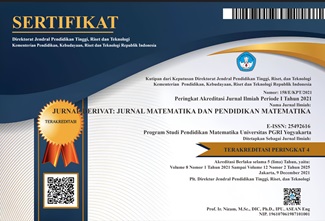Analisis Kemampuan Komunikasi Matematis Siswa Dengan Gaya Belajar Kompetitif
DOI:
https://doi.org/10.31316/j.derivat.v4i2.155Abstract
The purpose of this study is to analyze the communication skills of students of SMP Eka Sakti Semarang who have a competitive learning style. The type of research is descriptive qualitative. Data collection techniques using test methods and interviews. The subjects consist of 2 grade VII students who have a competitive learning style. The data validity technique uses source triangulation. The results showed that both subjects showed the same mathematical communication ability indicators: 1) were less able to express mathematical ideas through oral, written, and demonstrated and visualized; 2) able to understand, interpret and evaluate mathematical ideas either orally, or in visual form; and 3) able to use terms - mathematical notations through oral, written, and interpreting and visualizing. These results show that they understand the problems faced but are not accustomed to writing them coherently, this is due to the aggressiveness of students with competitive learning styles more motivate them to complete the job quickly and correctly rather than following the procedure.
Â
Keywords: mathematical communication, learning styleDownloads
Published
Issue
Section
Citation Check
License
Authors who publish with this journal agree to the following terms:
-
Authors retain copyright and grant the journal right of first publication with the work simultaneously licensed under a Creative Commons Attribution-ShareAlike 4.0 International License that allows others to share the work with an acknowledgment of the work's authorship and initial publication in this journal.
- Authors are able to enter into separate, additional contractual arrangements for the non-exclusive distribution of the journal's published version of the work (e.g., post it to an institutional repository or publish it in a book), with an acknowledgment of its initial publication in this journal.
- Authors are permitted and encouraged to post their work online (e.g., in institutional repositories or on their website) prior to and during the submission process, as it can lead to productive exchanges, as well as earlier and greater citation of published work (See The Effect of Open Access).







